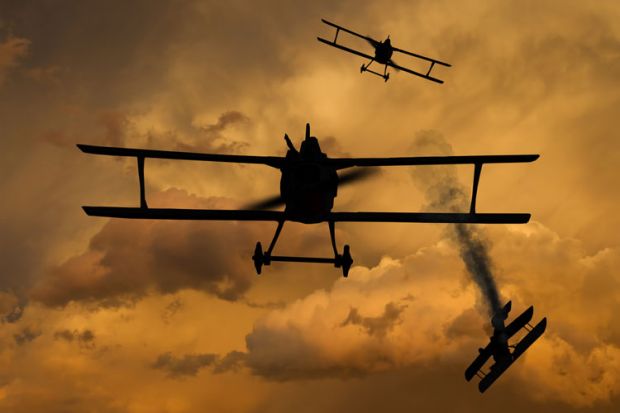The pilot project, part of the BBC’s World War One series of programming which marks the centenary of the start of the conflict, will pair short, three-week online courses on the FutureLearn Mooc platform with multimedia content from the BBC’s archive.
The universities taking part (see box below) will have access to rare video, audio and imagery from the BBC, some of which will not have been aired for decades. It is hoped that the process will allow the BBC to explore how it can work with British universities to enhance the quality of the UK’s online learning.
At a launch event at the BBC’s Old Broadcasting House in London on 23 July, FutureLearn chief executive, Simon Nelson, said that many Moocs had been “rightly criticised as just being a repackaging and redistribution of the traditional lecture format”, and that some universities were using the internet to “pump out videos”, rather than using their courses to tell a story. He said he hoped that working with the BBC would help institutions to be more creative.
“The greatest storytelling institution in the world is the BBC,” said Mr Nelson, himself the former controller of multi-platform commissioning at the corporation.
“Not only are we proud that the BBC is able to contribute content and co-create the courses…but it also brings that expertise in storytelling, and working with the universities to transform their ability to take their world-class educational expertise to new limits.”
To support the pilot, the BBC is producing four new “iWonder guides”, online videos that answer questions about a range of topics. The new programmes will be based on the subjects tackled in the Moocs, and will be presented by well-known BBC presenters Dan Snow, Sian Williams and David Shukman, and soldier Johnson Beharry, who was awarded the Victoria Cross in 2005.
Peter Gray, senior research fellow in air power studies at the University of Birmingham’s Centre for War Studies, who will teach a Mooc on aviation, said the courses would contain material that the average person on the street could learn from, but that there would also be aspects to challenge undergraduates and master’s students. “It’s pitched at all these levels, so that there’s something everybody can learn from,” he said.
Sinéad Rocks, acting controller of BBC Learning, said the BBC was “committed to education and looking at how we can exploit technology to best serve audiences”.
“MOOCs are an interesting and exciting area, and I’m looking forward to exploring what role we might play,” she added.
The four WW1 FutureLearn Moocs:
- Aviation Comes of Age
University of Birmingham, from 20 October - Changing Faces of Heroism
University of Leeds, from October - Paris 1919: A New World Order?
University of Glasgow, from 13 October - Trauma and Memory
The Open University, from 3 November
Register to continue
Why register?
- Registration is free and only takes a moment
- Once registered, you can read 3 articles a month
- Sign up for our newsletter
Subscribe
Or subscribe for unlimited access to:
- Unlimited access to news, views, insights & reviews
- Digital editions
- Digital access to THE’s university and college rankings analysis
Already registered or a current subscriber? Login




